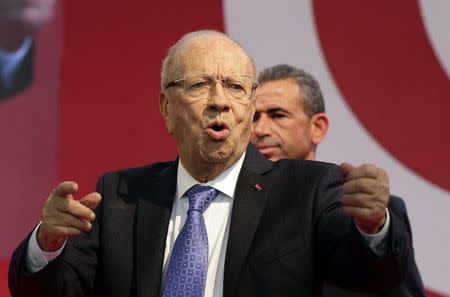
Beji Caid Essebsi
Polls opened Sunday in Tunisia's first presidential election since the 2011 revolution that ousted former dictator Zine El Abidine Ben Ali, a ballot set to round off the transition to democracy. Twenty seven candidates are vying for the post and the favorite is former premier Beji Caid Essebsi, an 87-year-old veteran whose anti-Islamist Nidaa Tounes party won the parliamentary elections last month.
Other candidates include outgoing President Moncef Marzouki, left-winger Hamma Hammami, several ministers who served Ben Ali, business magnate Slim Riahi and a lone woman, magistrate Kalthoum Kannou.
Some 5.3 million people are eligible to vote, with tens of thousands of police and troops deployed to guarantee security amid fears Islamist militants might seek to disrupt polling day.

Moncef Marzouki (Photo AFP)
Polling hours were restricted to just five in some 50 localities close to the Algerian border, where armed groups are active. Everywhere else, polls were due to close at 17:00 GMT.
A run-off vote will be held at the end of December if no one secures an absolute majority.
Until the revolution, Tunisia knew only two presidents – Habib Bourguiba, the "father of independence" from France in 1956, and Ben Ali, who deposed him in a 1987 coup.
To prevent another dictatorship, presidential powers have been restricted under a new constitution, with executive prerogatives transferred to a premier drawn from parliament's top party.
Essebsi has run on a campaign of "state prestige", a slogan with wide appeal to Tunisians anxious for an end to instability. Supporters argue only he can stand up to the Islamists who first held power in the post-Ben Ali era, but critics charge he is out to restore the old regime, having served under both former presidents.
Marzouki has been hammering home the argument that he is the only leader capable of preserving the gains of the uprising, and has said Sunday's vote is the "last stand" for the old guard. Hammami on the other hand is the leader of the left-wing Popular Front coalition, one of the only movements addressing the miserable condition of Tunisia's poor, who have been thumped by soaring inflation of around 6 percent.
Moderate Islamist party Ennahda, which came second in the legislative election, has not put up a candidate and has invited its members "to elect a president who will guarantee democracy."

Hamma Hammami (Photo Demotix)


.jpg)


No comments:
Post a Comment